ICE BY ANNA KAVAN...A SLIPSTREAM POST-APOCALYPTIC NOVEL
“As her fate, she accepted the world of ice, shining, shimmering, dead; she resigned herself to the triumph of glaciers and the death of the world.” 
Her hair was a blizzard, a shimmering cascade of pale luminous moonlight. She was fragile as if made of glass and crystal, built like a waif with pallid skin and bruised eyes. She is an ice sculpture carved out of a glacier that is shattered and reassembled time and time again. He needs her, desires her, craves her. He wants to clench the slender bones of her wrist and grip the gaunt thrust of her hip.
He finds her as the world is ending.
She belongs to another, but then he realizes that she is discontented. ”While she was happy I had dissociated myself, been outside the situation. Now I felt implicated, involved with her again.”
HE?
The unreliable narrator of this tale is suffering from daytime apparitions and nighttime terrors. The lurid concoctions of his agitated mind bleed certainty into the fantastical fooling, not only himself, but also this reader. He has seized his own deceptions and sees them for what they are, but understanding and containing them are two very different things. ”The hallucination of one moment did not fit the reality of the next.”
Ice is advancing across the Earth. He has the means to save her or at least put off the inevitable.
He is chasing a wraith. He loses her and finds her again only to have her turn to smoke in his hands. He knows she is real though everything must be questioned. She hates him. She misses him. She expects him to save her as she bashes him with her animosity. When he dreams of her, she is dead.
”I felt I had been defrauded: I was the only person entitled to inflict wounds. I leaned forward and touched her cold skin.”
He has a rival.
A doppleganger.
The split half of himself who is assertive, brutal, and obsessively possessive, The Narrator refers to him as The Warden, but it is unclear exactly who he is. I have lingering doubts about The Warden’s identity. Is he separate from The Narrator or is he merely just another personality that he jumps to when he needs to be someone else? Someone who can control the girl. The one who can remind her of who she is.
”Systematic bullying when she was most vulnerable had distorted the structure of her personality, made a victim of her, to be destroyed, either by things or by human beings, people or fjords and forests; it made no difference, in any case she could not escape. The irreparable damage inflicted had long ago rendered her fate inevitable.”
She is a victim, but he is starting to understand that he is a victim too. In her presence, sometimes he becomes someone unacceptable. Her very delicacy, her fracturability makes him want to hurt her, makes him need to hurt her.
Kindness is something he learns too late.
The world is so disturbing because he knows it comes from within his own mind.
Bruce Sterling termed the phrase slipstream to describe this type of writing long after this novel was published. He wrote:"...this is a kind of writing which simply makes you feel very strange; the way that living in the twentieth century makes you feel, if you are a person of a certain sensibility." I knew after reading only a few pages that I was going to have to read this novel quickly, feverishly, if I had any chance of staying in the boat as I swirled without paddles through the mind of Anna Kavan. I put Franz Kafka in the boat with me, but he too is a fragile soul, and became sea sick with the changing directions of this twisted plot. There are Kafka moments, especially when The Narrator is dealing with a government bureaucracy that is becoming more and more detached as the world becomes smaller. 
Anna Kavan was also a painter. This is her self-portrait.
Anna Kavan, AKA Helen Emily Woods, AKA Helen Ferguson, suffered from depression and heroin addiction. She was in and out of treatment centers her whole life. She attempted suicide, but survived each attempt. Many people believed that she passed away from an overdose in 1968, but she actually died from a heart attack. She burned all of her correspondence and her diaries before she died. This is truly unfortunate because I have a feeling that to most of us her diaries would be like trying to read Cumbric, but to a select few it would be like finding an extension of their own brain.
I can’t help thinking The Girl in this story is Anna Kavan. A fragile woman herself whom both men and women found to be attractive. Ultimately, The Girl in the story accepts her fate, and I tend to think that Kavan reached the same conclusions with her own life. She lived in seclusion. Though venerated by many writers, most of her work was published after her death. She was a lost girl who became a lost woman, incapable of escaping the ebb and flow of a mind that obviously saw the world differently. Like The Narrator, the barrier that most of us have between real life and fanciful thoughts must have been breached for her. Everything was real, and everything was imaginary. The disparity between one or the other is a hair's difference.
This novel is bleak and beautiful. Anna is so crafty and so lost; yet, so desperate to be found. I can already tell that I will never completely shake this novel off. I will remember the starkness of the trees, the desperate searching, the walls of ice, the escaping to be repossessed, and the nameless characters who together might form one being.
I purchased a first American hardcover edition of this book from Between the Covers Rare Books in New Jersey.
You can find more of my writing on my blog athttp://www.jeffreykeeten.com .
 3
3
IN COLD BLOOD BY TRUMAN CAPOTE
"How much money did you get from the Clutters?"
"Between forty and fifty dollars."
Top Picture Hickock, Richard Eugene (WM)28 KBI 97 093; FBI 859 273 A. Address: Edgerton, Kansas. Birthdate 6-6-31 Birthplace K.C., Kans. Height: 5-10 Weight: 175 Hair: Blond. Eyes: Blue. Build: Stout. Comp: Ruddy. Occup: Car Painter. Crime: Cheat & Defr. & Bad Checks. Paroled: 8-13-59 By: So. K.C.K.
Bottom Picture Smith, Perry Edward (WM) 27-59. Birthplace: Nevada. Height: 5-4. Weight: 156 Hair: D. Brn. Crime: B&E. Arrested: (blank) By: (blank). Disposition: Sent KSP 3-13-56 from Phillips Co. 5-10yrs. Rec. 3-14-56. Paroled: 7-6-59.
 2
2
THE CENTAUR BY JOHN UPDIKE
”It must be terrible to know so much.”
A pause.
“It is,” my father said. “It’s hell.”
Chiron depicted in Roman art. The Greeks always depicted him with human front legs. Chiron educated the children of the gods and goddesses so he is an apt mythological creature for George Caldwell to identify with.
WHITE HOUSE DIARY BY JIMMY CARTER

”A scholarly assessment after I left office showed that I had the most unfavorable press coverage of the century; with a net of negative news stories every month except for my first one, after my family and I walked down Pennsylvania Avenue to the White House. Despite frequent news conferences and a concerted effort to meet privately in the White House with all the key reporters and media executives, I was never able to turn them around. We finally decided to accept the situation and plow ahead with our programs.”
 5
5
MIDNIGHT IN EUROPE BY ALAN FURST

”Wouldn’t it be a better world if people revealed themselves? Did what they secretly wanted? ‘I know you want to kiss me,’ she said. ‘What are you afraid of?’ So he locked the door and they went ahead with it, his hands exploring her...She stood, removed hat and dress, then...suddenly self-conscious, ‘Would you look away for a moment?’ He did, discovering a perfect image of the dimly lit compartment in the dark window as she wriggled out of the girdle, freeing a cascade of soft, rosy flesh.” Parisian Girdle from the late 1930s.
Parisian Girdle from the late 1930s.
 3
3
WOLF HALL BY HILARY MANTEL

“Suppose within each book there is another book, and within every letter on every page another volume constantly unfolding; but these volumes take no space on the desk. Suppose knowledge could be reduced to a quintessence, held within a picture, a sign, held within a place which is no place. Suppose the human skull were to become capacious, spaces opening inside it, humming chambers like beehives.”
Thomas Cromwell by Hans Holbein. Cromwell was a great supporter of Holbein and personal gave him many commissions for paintings, but also recommended him to the powerful people he knew.
 3
3
A FINE BALANCE BY ROHINTON MISTRY
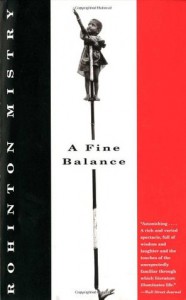
“You see, we cannot draw lines and compartments and refuse to budge beyond them. Sometimes you have to use your failures as stepping-stones to success. You have to maintain a fine balance between hope and despair.' He paused, considering what he had just said. 'Yes', he repeated. 'In the end, it's all a question of balance.’ ” 
A Fine Balance
 3
3
BLUE ANGEL BY DONALD SPOTO
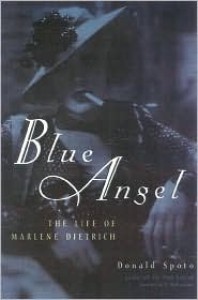
”It is a woman’s job to sense the hungers in men and to satisfy them without, at the same time, giving so much of herself that men become bored with her. It is the same with acting. Each man or woman should be able to find in the actress the thing he or she most desires and still be left with the promise that they will find something new and exciting every time they see her again.” Marlene Dietrich
Marlene Dietrich was obsessed with lighting her whole career. She always demanded a full length mirror to be just off stage so she could check to see if the lighting was perfect.
 4
4
IN A LONELY PLACE BY DOROTHY B. HUGHES
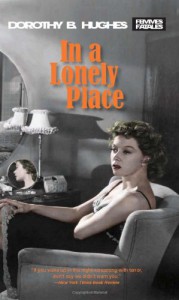
“Once he’d had happiness but for so brief a time; happiness was made of quicksilver, it ran out of your hand like quicksilver. There was the heat of tears suddenly in his eyes and he shook his head angrily. He would not think about it, he would never think of that again. It was long ago in an ancient past. To hell with happiness. More important was excitement and power and the hot stir of lust. Those made you forget. They made happiness a pink marshmallow.” 
Dorothy B. Hughes
 2
2
PATRIARCH RUN BY BENJAMIN DANCER

”About three thousand years ago there was a Chinese artificer named Yan Shi who made a robot that looked like a person. It could walk, sing and dance. And it had an eye for women.”
It was clear from Billy’s expression that he was skeptical about such things.
“One day Yan Shi brought is robot to the king. Nobody had ever seen anything like it. The exhibition went perfectly until the robot started being lewd with the women. That incensed the king.
Yan Shi knew he would lose his life if he couldn’t get the king to excuse the robot’s behavior. So he dismantled it.
When the king saw all the parts, he was amazed. The robot had muscles over the bones. Tendons and ligaments. It had hair and teeth.”
Billy had stopped eating. His eyes were but slits, and he was looking at the Colonel sideways. “How did he make it?”
“I don’t know.”
“How come the Chinese can’t make one like that today?”
“Maybe they can.”
Yan Shi, the artificer. Photo kindly supplied by Benjamin Dancer.
 4
4
ONCE YOU BREAK A KNUCKLE BY D. W. WILSON
 ”It always seems like everything’s the same until the moment when you need everything to be the same. Then you find out it’s been different the whole time.” From the story The Persistence.
I’m really surprised to discover that someone growing up in Invermere, BC could have a similar experience to a kid growing up in Glade, Kansas. Small towns, it seems are similar everywhere. I can’t tell you how irritated I was when Sarah Palin was going around the country talking about Small Town Values. It made me want to upchuck. I had lived in some major cities by then, Tucson, Phoenix, San Francisco, and had spent time in most of the major cities in the United States. One thing I’ve discovered is that people are people and what good people value are pretty much the same things good people value everywhere. Big city people can be just as friendly if not more so than small town people who generally, frankly, are hindered by inbred discriminations against anyone they didn’t grow up with. Nothing personal, you're just not from around here. If you listen to Sarah Palin small towns are the paragons of virtue, but what I’ve discovered is that adultery, fornication of all kinds( yes what you are thinking), too much drinking, drugs, and true evil are as prevalent in small towns as in big cities.
Now D. W. Wilson embraces all of that, but what is endearing about his characters are they are fundamentally good people struggling with life. I grew up with a bunch of guys that hung together because of bisecting interests. I’d say that we were a little more intelligent than the average teenager. We dated the same pack of girls and took similar classes. We went out for sports. We became officers in FFA, muscling out the upperclassmen our sophomore year to take control of the direction of chapter. We supported one of our members to be class president our senior year. Ultimately we were held up by one thing:
”We were never the kids who ran the town--it never felt like ours, probably because none of us ever intended to stay.” From the story Once You Break a Knuckle.
Every relationship we had was temporary because we weren’t staying. It was like a mantra we would keep reminded each other of.
”Small town girls, Twigg might mumble into his pint. They come into your life and then they’re gone and you’ve forgotten them just as quick. You know how it is. You know how it is.” From the story Accelerant.
But there is always that one girl that for a moment you think about throwing all your dreams and your expectations for yourself out the window of a fast moving Chevy.
”She sucked the rest of the whiskey and pointed at the sky where a trail of turquoise streaked across the horizon--the northern lights, earlier than I’d ever known them. She just stood there for a second with her back to me and those light around her. Christ, she was so pretty. Then she whipped the empty bottle off the summit, and I stared at her and thought about her and waited for the sound of the bottle breaking way, way below us.” From the story The Dead Roads.
Then you wake up and realize you might as well just drown yourself in the nearest rusty cattle tank.
There are a lot about fathers and sons in this collection. There is conflict and love and fear.
”He wanted to grab his dad’s hair and smash that face into a tabletop, until the wood was dented with his dad’s front teeth and all that remained in his fist was a bloody husk of hair and sinew.” From the story Valley Echo.
I never felt that much anger at my Dad. I only made him really mad one time. I was disking a field and these two young ladies I knew tracked me down and asked me if I could go to the lake with them. An hour no more... which ended up being closer to three. When they dropped me back at the field my Dad was driving the tractor. I waited at the edge of the field until he made a circle and pulled up in a cloud of dust or it could have been a cloud of my shame. He stepped out of the tractor and pushed me. I hit him in the chest, which turned out to be one of his least vulnerable spots. I nearly broke my thumb. It was black and blue for several days and sore for weeks. He pushed me again towards the road and got back in the tractor and drove off. I walked about five miles home. We never spoke about it again.
”I imagined my old man behind me, on the slope with arms crossed, dwindling to an outline, a silhouette, a shadow.” From the story Reception.
My grandfather died from a massive heart attack at 45. My father found him, black tongue extended. He’d been throwing some feed into the horse bunks when his heart seized. My father was 14. It just so happened that when I turned 14 my father was 45. He didn’t talk about it with me, but the house was small and I heard his conversations with life insurance agents. That same year I remember my mom waking me up at 2AM and asking me to go look for my father. My heart was in my throat as I started the pickup letting the engine warm up. It was hard for me to conceive that anything could happen to my Dad that he didn’t want to have happen. I drove around through all the pastures thinking he had been restless and had decided to check cattle. It was spooky being out that time of the night, black as pitch. The cattle’s eyes glowed from the light of my high beams. Shadows looked menacing. My mind began to imagine the absolute worst possibilities. I finally came home without finding him. I was worried about what my mom would say regarding my failure. Luckily he was back, healthy, angry at mom, but he chucked my chin and ruffled my hair and told me to get back to bed.
Wilson talks about sons. The struggles they have to find themselves, respect their fathers, and at the same time make them proud of them. Yes, I was one of those guys with tears welling when Kevin Costner asked his Dad if he wanted to have a catch.
”Together we’ve raised our sons to be someone into whose care you could entrust a belonging.” From the story The Mathematics of Friedrich Gauss.
This line made me gasp because it encapsulated the way I feel about my son. He is loyal, warm, considerate, and strong. He will be a rock for the woman lucky enough to win his love.
My London Bookseller recommended this to me along with D. W. Wilson’s first novel Ballistics. I got to say Nick came through for me again. I loved the way these stories weave around each other with characters starring in one story and appearing as a sidekick in the next. Wilson explores all facets of this community of people. He shows how hard life is and how difficult it is to be happy. He shows how destructive people are, not intentionally, but breaking dreams of other people in the process of trying to figure out their own lives.
Obviously this book clicked over a lot of memories for me. It made me think about things I haven’t thought about for years. His short story The Dead Roads won the 2011 BBC Short Story Award and it was certainly one of my favorites, but the rest of the collection had the same muscular confidence as the one that won the award. I’m definitely going to read his novel and see what he can do with a longer arc of plotting. ”Promotions, he told me, are a lot like blowjobs: easy to get if you’re willing to go somewhere dirty.” From the story The Elasticity of Bone. So get a little dirty with D. W. Wilson. You might get beer spilled on your lap or grease on your clothes or dirt on your skin, but in the process you might appreciate who you have and what you have just a little bit more.
”It always seems like everything’s the same until the moment when you need everything to be the same. Then you find out it’s been different the whole time.” From the story The Persistence.
I’m really surprised to discover that someone growing up in Invermere, BC could have a similar experience to a kid growing up in Glade, Kansas. Small towns, it seems are similar everywhere. I can’t tell you how irritated I was when Sarah Palin was going around the country talking about Small Town Values. It made me want to upchuck. I had lived in some major cities by then, Tucson, Phoenix, San Francisco, and had spent time in most of the major cities in the United States. One thing I’ve discovered is that people are people and what good people value are pretty much the same things good people value everywhere. Big city people can be just as friendly if not more so than small town people who generally, frankly, are hindered by inbred discriminations against anyone they didn’t grow up with. Nothing personal, you're just not from around here. If you listen to Sarah Palin small towns are the paragons of virtue, but what I’ve discovered is that adultery, fornication of all kinds( yes what you are thinking), too much drinking, drugs, and true evil are as prevalent in small towns as in big cities.
Now D. W. Wilson embraces all of that, but what is endearing about his characters are they are fundamentally good people struggling with life. I grew up with a bunch of guys that hung together because of bisecting interests. I’d say that we were a little more intelligent than the average teenager. We dated the same pack of girls and took similar classes. We went out for sports. We became officers in FFA, muscling out the upperclassmen our sophomore year to take control of the direction of chapter. We supported one of our members to be class president our senior year. Ultimately we were held up by one thing:
”We were never the kids who ran the town--it never felt like ours, probably because none of us ever intended to stay.” From the story Once You Break a Knuckle.
Every relationship we had was temporary because we weren’t staying. It was like a mantra we would keep reminded each other of.
”Small town girls, Twigg might mumble into his pint. They come into your life and then they’re gone and you’ve forgotten them just as quick. You know how it is. You know how it is.” From the story Accelerant.
But there is always that one girl that for a moment you think about throwing all your dreams and your expectations for yourself out the window of a fast moving Chevy.
”She sucked the rest of the whiskey and pointed at the sky where a trail of turquoise streaked across the horizon--the northern lights, earlier than I’d ever known them. She just stood there for a second with her back to me and those light around her. Christ, she was so pretty. Then she whipped the empty bottle off the summit, and I stared at her and thought about her and waited for the sound of the bottle breaking way, way below us.” From the story The Dead Roads.
Then you wake up and realize you might as well just drown yourself in the nearest rusty cattle tank.
There are a lot about fathers and sons in this collection. There is conflict and love and fear.
”He wanted to grab his dad’s hair and smash that face into a tabletop, until the wood was dented with his dad’s front teeth and all that remained in his fist was a bloody husk of hair and sinew.” From the story Valley Echo.
I never felt that much anger at my Dad. I only made him really mad one time. I was disking a field and these two young ladies I knew tracked me down and asked me if I could go to the lake with them. An hour no more... which ended up being closer to three. When they dropped me back at the field my Dad was driving the tractor. I waited at the edge of the field until he made a circle and pulled up in a cloud of dust or it could have been a cloud of my shame. He stepped out of the tractor and pushed me. I hit him in the chest, which turned out to be one of his least vulnerable spots. I nearly broke my thumb. It was black and blue for several days and sore for weeks. He pushed me again towards the road and got back in the tractor and drove off. I walked about five miles home. We never spoke about it again.
”I imagined my old man behind me, on the slope with arms crossed, dwindling to an outline, a silhouette, a shadow.” From the story Reception.
My grandfather died from a massive heart attack at 45. My father found him, black tongue extended. He’d been throwing some feed into the horse bunks when his heart seized. My father was 14. It just so happened that when I turned 14 my father was 45. He didn’t talk about it with me, but the house was small and I heard his conversations with life insurance agents. That same year I remember my mom waking me up at 2AM and asking me to go look for my father. My heart was in my throat as I started the pickup letting the engine warm up. It was hard for me to conceive that anything could happen to my Dad that he didn’t want to have happen. I drove around through all the pastures thinking he had been restless and had decided to check cattle. It was spooky being out that time of the night, black as pitch. The cattle’s eyes glowed from the light of my high beams. Shadows looked menacing. My mind began to imagine the absolute worst possibilities. I finally came home without finding him. I was worried about what my mom would say regarding my failure. Luckily he was back, healthy, angry at mom, but he chucked my chin and ruffled my hair and told me to get back to bed.
Wilson talks about sons. The struggles they have to find themselves, respect their fathers, and at the same time make them proud of them. Yes, I was one of those guys with tears welling when Kevin Costner asked his Dad if he wanted to have a catch.
”Together we’ve raised our sons to be someone into whose care you could entrust a belonging.” From the story The Mathematics of Friedrich Gauss.
This line made me gasp because it encapsulated the way I feel about my son. He is loyal, warm, considerate, and strong. He will be a rock for the woman lucky enough to win his love.
My London Bookseller recommended this to me along with D. W. Wilson’s first novel Ballistics. I got to say Nick came through for me again. I loved the way these stories weave around each other with characters starring in one story and appearing as a sidekick in the next. Wilson explores all facets of this community of people. He shows how hard life is and how difficult it is to be happy. He shows how destructive people are, not intentionally, but breaking dreams of other people in the process of trying to figure out their own lives.
Obviously this book clicked over a lot of memories for me. It made me think about things I haven’t thought about for years. His short story The Dead Roads won the 2011 BBC Short Story Award and it was certainly one of my favorites, but the rest of the collection had the same muscular confidence as the one that won the award. I’m definitely going to read his novel and see what he can do with a longer arc of plotting. ”Promotions, he told me, are a lot like blowjobs: easy to get if you’re willing to go somewhere dirty.” From the story The Elasticity of Bone. So get a little dirty with D. W. Wilson. You might get beer spilled on your lap or grease on your clothes or dirt on your skin, but in the process you might appreciate who you have and what you have just a little bit more.
 4
4
JOHN QUINCY ADAMS BY FRED KAPLAN
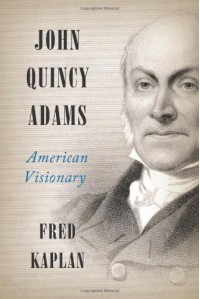
”If your actions inspire others to dream more, learn more, do more and become more, you are a leader.”
John Quincy Adams
John Quincy Adams at age 29 by John Singleton Copley. JOHN HAD HAIR!
I TRAVEL BY NIGHT BY ROBERT MCCAMMON

Trevor Lawson
Hotel Sanctuaire
All Matters Handled
I Travel By Night
Trevor Lawson, Captain in the 19th Alabama Confederate Army, last seen ALIVE at the battle of Shiloh, has been turned into a creature of the night. Unlike most people who have been turned he desperately hangs onto the last shreds of his humanity. In fact, instead of embracing the darkness he has been infected with, he works days and nights to destroy the very creatures that have handed him this god forsaken curse.
IN ONE PERSON BY JOHN IRVING

”Look, here it is--I just have to say this,” young Kittredge said; he almost couldn’t look at me. “i don’t know you, I admit--I don’t have a clue who my father really was, either, But I’ve read all your books, and I know what you do--I mean, in your writing. You make all these sexual extremes seem normal--that what you do. Like Gee, that girl, or what she is--or what she’s becoming. You create these characters who are so sexually ‘different,’ as you might call them--or ‘fucked up,’ which is what I would call them--and then you expect us to sympathize with them, or feel sorry for them, or something.”
“Yes, that’s more or less what I do.” I told him.
John Irving doing that thing he do.
 2
2
UNDER WESTERN EYES BY JOSEPH CONRAD

“I am quite willing to be the blind instrument of higher ends. To give one's life for the cause is nothing. But to have one's illusions destroyed - that is really almost more than one can bear.” 
Joseph Conrad
Razumov is serious about his studies. He is quiet, and like most men who brood, there is attributed to him by the people he knows a depth of wisdom that isn’t due to his eloquent conversations or his grand standing on theories, but simply attributed to him because he doesn’t say enough to dispel the illusion. Razumov seems like a man who is stewing about the state of affairs, and might be hatching a scheme to do something seditious. He is, needless to say, lonely.
 3
3
CITY OF THIEVES BY DAVID BENIOFF
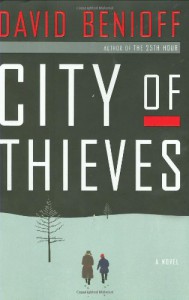
”How could you fear anything more than death?
Everything else offered moments of escape: a paralyzed man could still read Dickens; a man in the grips of dementia might have flashes of the most absurd beauty.”
Lev Beniov wants to live. He may not be clear about anything else, but he knows that to be true. Life becomes more precious when being anywhere, not just in the wrong place, but just existing in space, can turn into a death trap at any moment. When his mother and sister fled the city he decided to stay. Now he is caught up in one of the worst sieges in the history of the world, he is in Leningrad or as I always think of it St. Petersburg.
Lev is seventeen years old. 
Because it is mostly a city of islands, Leningrad was isolated from the rest of the Soviet Union by the Nazis’ control or destruction of its bridges.
 2
2




 6
6